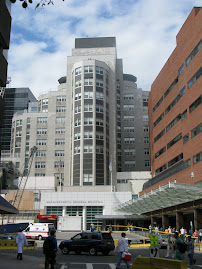In the lab, I finally finished finding our optimized conditions for the RT-PCR. The final step in finding these conditions was to run an RT-PCR with GAPDH primers (reliable, known primers we have) and the Hippo Primers in parallel. I needed to run different ratios of these primers to find a baseline ratio where the PCR could produce enough and equal amounts of each product (Hippo and GAPDH). This will allow me to compare the differences between normal Pancreas and Pancreatic Adenocarcinoma down the line. After the PCR, I found the correct ratios for three of the five Hippo primers. As for the other two, I found that the annealing temperature of 52 degrees was not producing accurate products from the cDNA. By using another temperature gradient during the PCR, I found that 61 degrees produced much more accurate products. I also tried increasing the magnesium (Mg2+) concentration in the PCR, which typically increases specificity of the primers binding to the cDNA. However, this didn't help out in the end. Now I officially have all of the optimized conditions for each Hippo primer, and next week I will finally compare PDAC and normal pancreatic samples. I may also compare chronic pancreatitis samples as well.
Although it has taken me five weeks to find these conditions, and I still don't have any conclusions on the Hippo project, this process has taught me a LOT about science. First of all, things rarely go the way you expect them to. However, you have to do your best with what you have and troubleshoot your way through the problems so that you can find answers to what is actually going wrong. I've also learned that research is just that: RE-search. You have to do experiments many times over and over. And many times, you are wrong. While this is often frustrating, it all has to be dealt with. I have also learned more and more about Pancreatic Cancer, lab techniques, and lab procedures.
For my clinical rotation this week, I ventured into the SICU (Surgical Intensive Care Unit). I first saw Dr. Bigatello (an attending in the SICU) give a short lecture on Acute Lung Injury and Acute Respiratory Distress Syndrome. This was very interesting (and confusing!) because treating these patients is a HUGE balancing act. There was a lot that went over my head, but what I did understand was very interesting. I spent the majority of the morning on rounds with a SICU team comprised of attendings, residents, anesthesiologists, interns, and more. They all worked together on discussing what treatments the patients have received and are going to receive. This was incredible to observe for two reasons. The first was that it was amazing to see all the different types of patients in the SICU. I saw everything from a 91 year old woman who had a hernia to a morbidly obese woman who had recently had gastric bypass surgery and couldn't breathe on her own because of her weight. Every patient had to receive majorly different treatments, and each of these treatments had to be examined extremely carefully. The second reason this was so incredible was that I got to see how rounds actually works. I was very interested in seeing the team dynamic between the attendings, residents, interns, etc.: Everyone had an equal say, and while Dr. Bigatello clearly had authority, their teamwork was outstanding.
Overall the week was great. Harvard is still awesome. Although I miss home, I don't want to go home because there is not much time here left, and I'm trying to savor every moment.
-Mike













No comments:
Post a Comment